Is Unfairness the Cause of Hive's Low User Retention?
Just over a year ago I wrote a series of posts exploring user retention on Hive. In part I wanted to use data to explore how user retention has changed, how it has effected the growth of the project, but the main aim when writing the series was to try and answer "why do so many users leave Hive?".
If you ask the community, it will seem like this question is very easy to answer. Many people will tell you it's because of the complexity of the user experience such as the need to use and store crypto keys. Others will tell you with certainty that it's because downvoting exists, and its existence is stifling to new users. Several other answers will be given, but the problem in general with all of these explanations is a lack of data. It's easy to say that one thing is leading to another, and even to provide a reasoning that seems sound. It's harder to demonstrate it to be true with data. Until we can do that, we're making stabs in the dark - we all have competing ideas of what needs to be changed but any or all of those ideas can be wrong.
In that series, I did manage to come to at least one meaningful conclusion about user retention on Hive, ruling out one of the leading explanations. Hive users do not leave because of lack of rewards, indeed if anything the data suggests that users leave in greater numbers when rewards are high. It also appears to have little to do with bear markets, again if anything bull markets feature lower user retention than bear markets - the problem in bear markets typically becomes a lack of new joiners.
I eventually stopped posting on the user retention series because some of the hypotheses are really hard to test with the data I can extract from @hivesql - particularly my personal favorite which is poor user experience, especially handling crypto keys. I don't know how to test that with the resources I have available, nor the downvote hypothesis.
More recently however I have been exploring granger causality on Hive, a statistical method to explore possible causal links that can be found in data. With this method, I can come back to some of the ideas around user retention, such as the comments by @revisesociology and @markwhittam in that post.
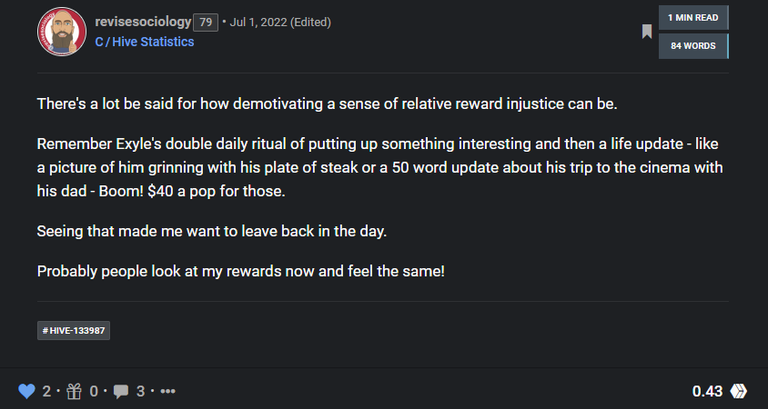
https://peakd.com/hive-133987/@revisesociology/re-demotruk-recxsm
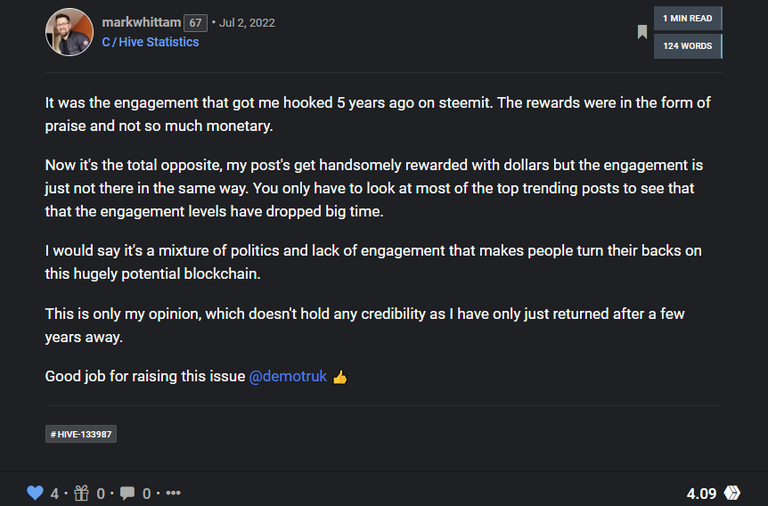
There are a couple of interesting, testable hypotheses in these comments, and a third if you combine them.
- Users leave because of perceived unfairness of rewards
- Users leave because of lack of engagement
- Users leave because of perceived unfairness in engagement.
In this post, I will examine the first hypothesis with granger testing, and also with the same methodology I will examine if levels of inequality can be used to predict changes in the price of Hive.
Preparing the Data
To test the hypothesis that users leave because of perceived unfairness of rewards, it must be reframed as something more measurable. My post on inequality on Hive described using the Gini Coefficient as a measurement of inequality on Hive, and it explored how rewards inequality has changed over time. For this test, we will use rewards inequality as a proxy as it is more readily measurable. Unfairness and inequality are related concepts but not the same. It is quite possible for something to be "equal" but still be perceived as unfair, for example if two people receive the same rewards but where one had put in far more effort into their work than other. Or there is just the perception that one person put in much more work than the other. For our purposes though, we will simply examine inequality as a factor.
For a better understanding of the methods here, check out my first post examining the impact of Splinterlands on the price of Hive, or check out the Wikipedia page or Real Statistics guide on Granger causality.
First we must examine if the rewards gini coefficient on Hive qualifies as "stationary". Here is the chart from the post on inequality.
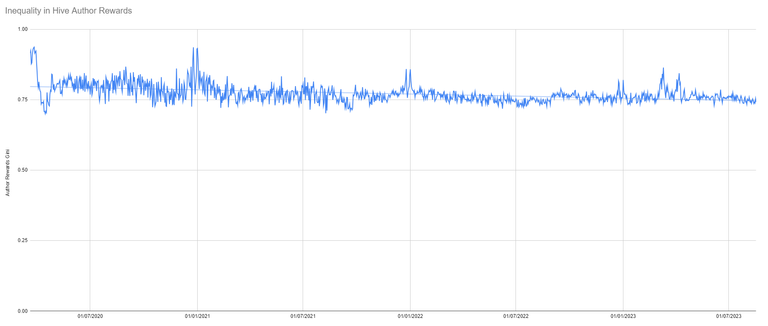
Since there is a slight trend, I suspect the data might not be stationary, but we will perform Augmented Dickey-Fuller tests anyway.
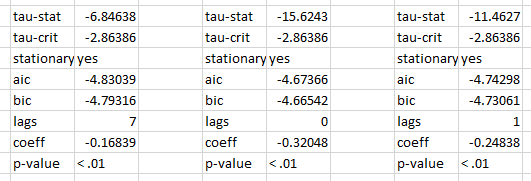
It turns out to be stationary, so we do not need to do anything more to find a stationary dataset.
The first data we will test it against is the daily change in active users.
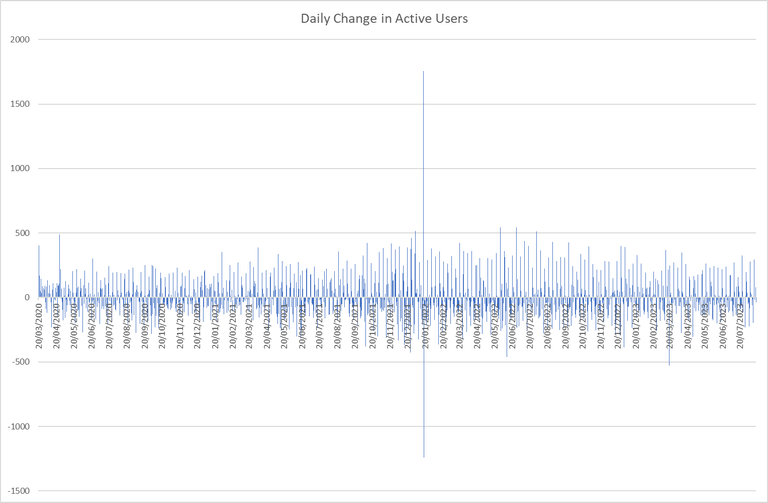
This dataset is also determined to be stationary.
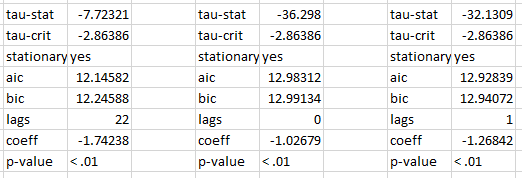
First a correlation: -0.00248. This is a negative correlation but trivially small, indicating there is basically no immediate relationship between rewards inequality and changes in active users, which probably should not be a surprise.
Given that both datasets are stationary, we can now examine them with Granger Testing. As before, statistically significant findings are highlighted in yellow. The strongest effects (F > 3) are further highlighted in green.
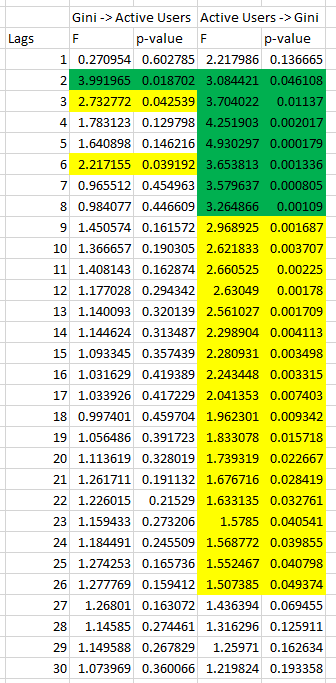
We can see that there do appear to be causal links between inequality on Hive and user activity, in both directions.
Finally let's examine the relationship that rewards inequality has on the Hive price. There is a very weak negative correlation between inequality and the price of Hive: -0.159. This means that the higher inequality, the lower the price of Hive, but the relationship is very weak and it says very little with regard to causality.
Daily changes in the price of Hive have been determined to be stationary in previous posts. Granger tests are below.
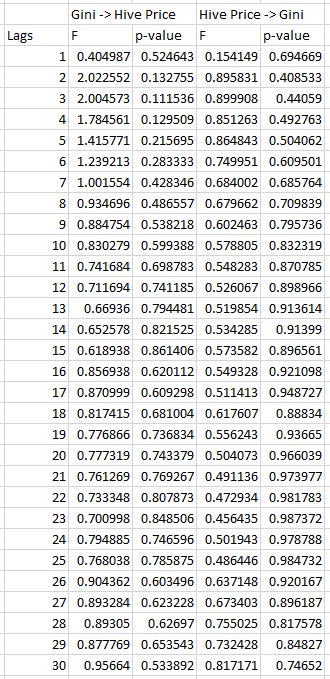
No fields are highlighted because there is no statistically significant finding here.
Conclusions
The level of inequality of rewards appear to have an impact on user activity within 2 to 3 days after users make a post. This impact is considerably less than the impact that price has on user activity, but it warrants further investigation. Consider when most users stop posting. The vast majority of accounts never make a post or comment at all, but of those who do become active, 24% have made their last post or comment within 3 days of joining.
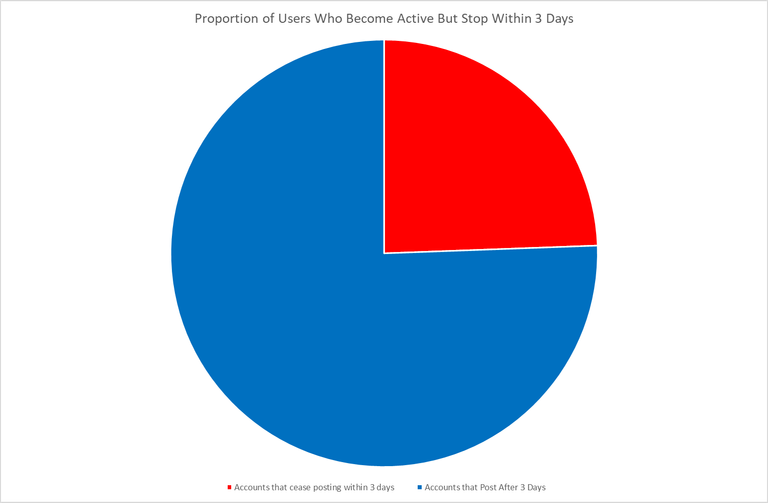
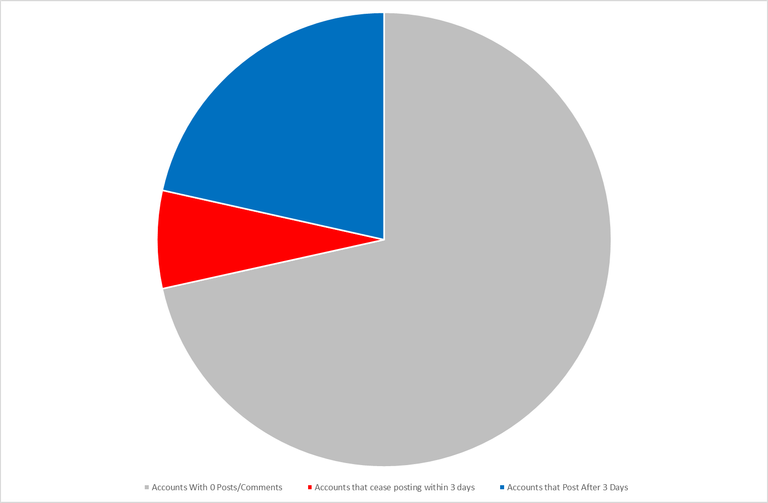
Given this, and the results from the granger test above, it is entirely possible that inequality of rewards contributes to a substantial part of our user retention problem. At the very least it is worth looking into this further.
Changes in the number of active users has an impact on the equality of rewards. This is a longer lasting effect than the reverse, and can be seen from 2 days to 3 weeks after a change in active users. Perhaps this represents a larger number of users competing for the same pool of rewards, with more new users making for higher inequality.
There is no statistically significant impact to be identified in the data that rewards inequality has on price or the reverse. Perhaps this means that inequality has no relationship with the price at all, or perhaps the level of inequality has never reached a low enough level on Hive to have a measurable impact on price.
My statistics and analysis posts take many hours each to research, chart and write, so if you find them valuable and of interest to other Hivers, I appreciate your support in sharing, commenting, and/or upvoting my work. If you're interested in these kinds of stats posts, click the 'follow' button on my profile, or subscribe to the Hive Statistics Community which features daily Hive stats posts from @arcange as well as less regular posts from myself and others.
for me the problem is this:
I am interested in a platform kind of like twitter - short posts, a photo or two, not necessarily a high quality entries.
High quality entries require effort, and keeping them being published requires constant effort - I simply dont have time, power and franky speaking interesting things to share to be able to do it :)
Have you tried https://d.buzz ?
yup, still have to find out if I like it as it is just another browser like ecency or peakd if you know what I mean - I would like my BS to be separate from normal posts and normal ecosystem
I would guess that people leave because they realize that the amount of time and effort they have to put in is not worth it.
This has nothing to do with inequality, but a simple lack of equity. Do people quit their job in the real world because the CEO makes more money than them? No, this is the standard. People are very much used to that type of inequality.
If people could come to Hive and consistently make even $5 an hour they would stick around; especially people from developing nations where $5/h would actually be a pretty damn good wage.
On a real level Hive simply does not yet have the infrastructure to offer this kind of equity to the community. Blogging is a very niche activity. As more people try to earn from blogging massive diminishing returns kick in. At the end of the day we just need more jobs, and perhaps even training programs to seed them. 100% an infrastructure issue.
Is onboarding a pain in the ass? Sure? Is handling 4 keys a barrier to entry? Yes; many good points are made within your post, but none of them matter when people can actually come here and work for a fair wage. They can't so we're left wondering what the problem is and how we grease the wheels and fix it, but that is the core problem.
Of course unfairness is not lost on me:
If this was true, we would expect that users would leave at higher rates when the rewards are lower. There have been times when the median post reward was substantially higher but users leave at the same rate (or even slightly higher rates).
Consistency of rewards could be an explanation which could be measured and tested for as a competing hypothesis.
You are assuming that all types of work are a static variable in this equation.
Blogging is a pretty niche activity. What percentage of the population should write for a living?
If your job is to pass butter... might not matter how much you're getting paid. Passing the butter is boring and not interesting. Tedious and monotonous even. Though the task at hand of passing the butter is easy, the psychological effort of continuing to grind away doing the same thing over and over with very little guarantees could have... sub-optimal results.
Just kidding I would totally expect more people to leave when the rewards were lower.
Very interesting analysis you have here.
I think hive has a great thing to offer: communities. the problem is these communities quite often are murky places and people have no clue what to do with them, how to post, are their posts are gonna be interesting to others?
Kill me I have no idea what cent is all about, neoxian, pob xD
Great analysis and nice work putting it all together.
It has been said by others already but there are likely many factors that affect user retention. Others have made some good points on that but to add my personal opinion... I think that "user experience" probably plays the largest role overall for retention. I like Hive, of course, and would not leave, probably ever, but looking at it from an objective point of view or putting myself into others perspectives I'd say that Hive seriously lacks in user experience, especially when you compare it to its competition - i.e other social media sites like tiktock, instagram...etc. I don't use those sites but I know that they have great user experience. They are super user friendly and allow users to create top notch content quickly and easily. They have templates and sound tracks and filters built right into the platform for both photos and video. On Hive you can't even post a video into your content without writing a post in one app and then copy and pasting it into another and even then the video has to be edited yourself on another app if you want it to not look like a home movie. All of that makes for a very clunky and unejoyable user experience for both the content creator and consumer. Most Hive posts are pretty lame compared to the reels on those other sites. I suspect most people who join Hive think that they will get an Insta or tiktock-like experience with the addition of making money on top of it, but then they find out that not to be the case at all so they leave.
I think the fact that there are now three (more?) graphene Blockchain platforms. Steemit, Hive and the turd that is Blurt. Crypto is small and the subset that would actually want to blog for rewards must be smaller still. As they have all been around for a number of years the maximum available userbase must be near tapped out and users will have gravitated to the one that suits them. Steem for god knows what and blurt for cuckoo madness.
Perhaps hive with it's downvotes and policing of content is seen as fairer but less accessible to go on and scam or fake content.
People might not be able to keep up with the long form aspect of it without resorting to nefarious activities or recycling and just go to the one that suits them or back to the mainstream.
Can you tell me the percentage of users that have 50reps and more than 500hp, 60reps and less than 1000hp, and 70reps with less than 10k hp?
Why wouldn't people stay when they are getting 'free' money to cash out and waste on some consumerist bs?
IF you compare leavers with downvotes to those leavers without downvotes that may shed some light on their impact.
Remainers might also be informational.
How many people get downvotes and persist vs those that get them and leave?
The timing relative to dv's to leaving might shed some light, too.
I would suggest that price is impacted more by those with controlling amounts of stake rather than dumpers immediately dumping.
6% inflation is a rounding error once you have enough stake to control the price.
I harp on dumpers because dumping is not helping increase the relative value of hive.
IF those earning large amounts of it, 70+ reputation, are dumping it why would anyone else value what they don't?
At this point I'm gonna guess that in excess of 50% of existing coins are in the hands of fewer than 10 people.
I can't prove that, but the price remains really stable during periods of broader market turmoil, as it should when controlled by relatively few hands.
The issue for me is that this may end up being quite a complex query. Either difficult for the database to process for me or difficult for me to create the right query in the first place. The queries that I wrote for user retention took upwards of an hour to run and I expect this would be more complex than those. But you are right that it should be possible to analyze it with what we have in @hivesql
I expect there are lots of factors in why people leave. I suspect many come with the wrong expectations. It can take a lot of effort to coach someone in what works. I think some of the old guard have given up on that
I think the usability aspect is exaggerated as I know less techie people who manage okay. They may just not get the details of key security.
I suspect that there are many factors as well. If we can identify the biggest factors, we can prioritize those for the biggest potential gains.
I think the best hope is for groups of people to support each other with help and votes. If you sign up as an individual without knowing other users it's hard.
It's hard to get started on Hive as a blogger. It took me awhile to figure out what I was doing and I'm still learning. Once you find a community that is supportive it becomes much easier. I see so many people blogging on Splinterlands for example and are lucky to earn one Hive per post. Most of those folks aren't going to stick around since the "old guard" doesn't help them out to figure out what works. I'm not entirely sure how to fix that...
The first lesson is that nobody is entitled to rewards and the second is that it may seem unfair. The big accounts have their favourite topics and people. But everyone can earn something if they find an audience. That is not true on all other platforms.
I made very little when I started and knew hardly anyone. I had to work to get where I am
I agree with you, it's hard to start up but with hard work you can make it happen. Most platforms you can't just like you said. It's been a lot of work to get where I am as well, and I still have a long way to go!
Most people aren't bloggers or short-form content creators, they're just people who share here and there. They join Hive and adapt. But the problem is the perception that your posts if about your life must always be positive and with a lot of good quality pics and text. Most people are blogging on a phone, they don't have laptops. It takes longer to write something on a phone. So if a person spends a few hours and gets a buck in upvotes, they have the option of re-organizing themselves and joining a community or building a network or, if the want to stay and try again, changing frontends sometimes. That's where we're doing well as unlike in all those other chains (which aren't competitors at all and one has a compromised protocol), there are multiple frontends. Someone who doesn't want to write too much but wants to focus on photos can go to Liketu for example. Not everyone has to be a blogger at all, they can sit there playing Splinterlands all day. This wasn't the case when most of us joined years ago. Back then you got Condenser with Berwick at 10k a post on trending and you better like it this way.